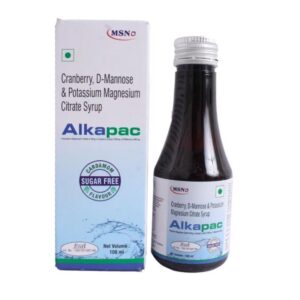POTASSIUM MAGNESIUM CITRTE + CRANBERRY EXTRACT
Potassium Magnesium Citrte: Potassium Magnesium Citrate is a medication that combines the minerals potassium and magnesium with citrate. It is commonly used to prevent and treat conditions such as kidney stones and low potassium levels in the blood.
The mechanism of action of Potassium Magnesium Citrate is multi-faceted. Firstly, it helps to increase urinary citrate levels, which inhibits the formation of certain crystals that can lead to kidney stones. Secondly, it helps to increase the pH of urine, making it less acidic and reducing the risk of crystal formation. Lastly, potassium and magnesium are essential minerals that play a role in various bodily functions, including nerve and muscle function.
The dose of Potassium Magnesium Citrate can vary depending on the specific condition being treated. It is important to follow the dosage instructions provided by your healthcare provider or as stated on the product label. Typically, it is taken orally in the form of a tablet or solution.
As with any medication, Potassium Magnesium Citrate may cause side effects. Common side effects include diarrhea, stomach discomfort, nausea, and vomiting. These side effects are usually mild and resolve on their own. In some cases, allergic reactions may occur, resulting in symptoms such as rash, itching, swelling, or difficulty breathing. If you experience any severe or persistent side effects, it is important to seek medical attention.
It’s important to note that Potassium Magnesium Citrate may interact with certain medications or medical conditions. It is crucial to inform your healthcare provider about all the medications you are taking and any medical conditions you have before starting this medication.
Overall, Potassium Magnesium Citrate is a medication that combines potassium, magnesium, and citrate to prevent and treat kidney stones, as well as address low potassium levels. It works by increasing urinary citrate levels, raising the pH of urine, and providing essential minerals for bodily functions. If prescribed this medication, it is important to follow the recommended dosage and be aware of potential side effects.
Cranberry Extract: Cranberry extract is a dietary supplement derived from cranberries, which are small, tart berries commonly consumed for their potential health benefits. It is primarily used for the prevention and treatment of urinary tract infections (UTIs).
The main active components in cranberry extract are proanthocyanidins (PACs). These PACs are believed to prevent bacteria, typically Escherichia coli, from attaching to the walls of the urinary tract, thereby reducing the risk of infection. Cranberry extract may also have antioxidant and anti-inflammatory properties.
The typical dose of cranberry extract is around 300-400 mg, taken once or twice daily. However, it is important to note that the recommended dose may vary depending on the manufacturer and the concentration of active compounds in the specific product. It is advisable to follow the instructions provided on the product packaging or consult a healthcare professional for appropriate dosing.
Cranberry extract is generally considered safe for most individuals when taken at recommended doses. However, some people may experience side effects such as stomach upset, diarrhea, or allergic reactions. Additionally, excessive intake of cranberry extract may increase the risk of kidney stones due to its high oxalate content. People with a history of kidney stones or oxalate-related disorders should exercise caution and consult a healthcare provider before using cranberry extract.
Individuals taking blood-thinning medications, such as warfarin, should also be cautious when using cranberry extract as it may enhance the effect of these drugs, potentially leading to an increased risk of bleeding.
It is important to note that cranberry extract should not be used as a substitute for medical treatment in case of severe UTIs. It is always advisable to consult a healthcare professional for proper diagnosis and treatment.

